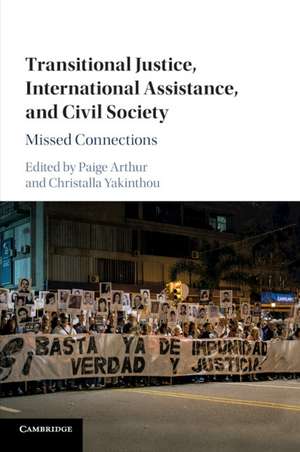Transitional Justice, International Assistance, and Civil Society: Missed Connections
Editat de Paige Arthur, Christalla Yakinthouen Limba Engleză Paperback – 7 aug 2019
Preț: 285.54 lei
Nou
Puncte Express: 428
Preț estimativ în valută:
54.64€ • 58.43$ • 45.56£
54.64€ • 58.43$ • 45.56£
Carte tipărită la comandă
Livrare economică 18 aprilie-02 mai
Preluare comenzi: 021 569.72.76
Specificații
ISBN-13: 9781316617724
ISBN-10: 1316617726
Pagini: 294
Ilustrații: 2 tables
Dimensiuni: 152 x 230 x 15 mm
Greutate: 0.4 kg
Editura: Cambridge University Press
Colecția Cambridge University Press
Locul publicării:New York, United States
ISBN-10: 1316617726
Pagini: 294
Ilustrații: 2 tables
Dimensiuni: 152 x 230 x 15 mm
Greutate: 0.4 kg
Editura: Cambridge University Press
Colecția Cambridge University Press
Locul publicării:New York, United States
Cuprins
Introduction: changing contexts of international assistance to transitional justice Paige Arthur and Christalla Yakinthou; Part I. Understanding Cases: 1. From reconciliation to rule of law: the shifting landscape of international TJ assistance in Guatemala Anita Isaacs and Rachel Schwartz; 2. Fighting windmills, ignoring dragons: international assistance to civil society in post-conflict Bosnia and Herzegovina Christalla Yakinthou; 3. Sending the wrong signal: international assistance and the decline of civil society action on TJ in Morocco Paige Arthur; 4. Off the agenda as Uganda moves towards development: Uganda's transitional justice process Tania Bernath; 5. Hybrid court, hybrid peacebuilding in Cambodia Laura McGrew; Part II. Conceptualizing the Connections: 6. Reframing friction: a four-lens framework for explaining shifts, fractures, and gaps in transitional justice Christalla Yakinthou; Why do donors choose to fund transitional justice? Paige Arthur; Conclusion: refocusing on civil society: how to make – not miss – connections Paige Arthur and Christalla Yakinthou.
Descriere
Explores how international assistance shapes transitional justice around the world, and asks how civil society can play a larger role in them.
